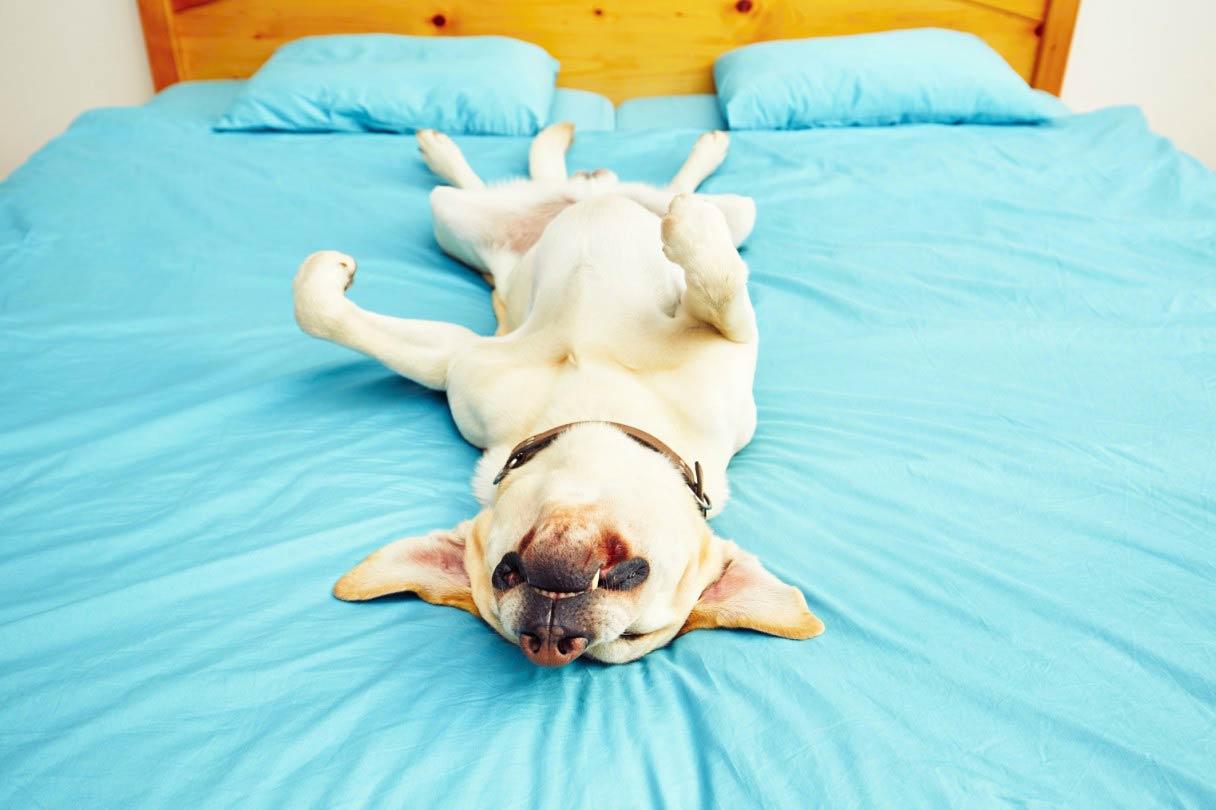As every dog owner knows, a well-rested dog is a happy dog. But what can you do if your four-legged friend is struggling to drift off to sleep? Whether it’s late-night barking, restless pacing, or simply a case of the zoomies, getting your dog to sleep through the night can be a frustrating challenge. Fortunately, there are several proven techniques that can help you create a peaceful sleep routine and ensure both you and your canine companion get the restful nights you deserve.

Image: www.laifug.com
First and foremost, it’s crucial to establish a regular sleep-wake cycle for your dog. This means going to bed and waking up around the same time each day, even on weekends. Dogs are creatures of habit and they thrive on routine, so a consistent sleep schedule will help them anticipate bedtime and wind down accordingly.
Creating a Calming Bedtime Routine
Just like humans, dogs need time to unwind before bed. Creating a calming bedtime routine can signal to your dog that it’s time to settle down. Start by giving your dog a warm bath or a gentle massage. You can also try calming music or soft white noise to create a relaxing atmosphere. One of the most important aspects of a bedtime routine is regular exercise, as it helps to tire your dog out both physically and mentally. Aim for at least 30 minutes of exercise each day, with a final walk or romp in the park shortly before bedtime.
Once your dog has a regular sleep-wake cycle, you can start implementing specific techniques to help them sleep through the night. One of the most effective is to establish a designated sleep area for your dog. This could be a crate in a quiet corner of the bedroom, a cozy dog bed with plenty of blankets, or even just a space on the floor where they always sleep. Make sure their bed is comfortable, safe, and dark, as darkness helps to trigger sleep hormone release.
Understanding Common Sleep Issues
If your dog is still struggling to sleep despite a regular schedule and a calming bedtime routine, it may be helpful to identify any potential underlying causes. One common sleep issue for dogs is separation anxiety, which can cause them to whine, bark, or pace when left alone. If you think your dog may be suffering from separation anxiety, it’s important to seek professional help from a veterinarian or animal behaviorist.
Another potential sleep issue is medical conditions. For example, pain or discomfort due to joint problems, allergies, or other health issues can disrupt a dog’s sleep pattern. If you notice any signs that your dog is in pain, schedule an appointment with your veterinarian to rule out any underlying medical causes.
Tips and Expert Advice
In addition to the strategies mentioned above, here are some additional tips and expert advice from experienced dog owners and veterinarians:
- Avoid giving your dog any caffeine or chocolate before bed, as these substances can interfere with sleep.
- Make sure your dog’s bed is not too hot or too cold. Dogs prefer to sleep in a slightly cool environment.
- If your dog is still having trouble sleeping, you may want to try using a white noise machine or a fan to block out any disruptive sounds.
- If all else fails, you may need to consult with a veterinarian to discuss prescription medications that can help your dog sleep.

Image: animalia-life.club
FAQ
Q: Why does my dog sleep so much?
A: Dogs sleep more than humans, typically around 12-14 hours per day. Puppies and older dogs tend to sleep even more. There are many reasons why dogs sleep so much, including sleep cycles, metabolism, and activity levels.
Q: Why does my dog sleep on my chest?
A: There are many reasons why a dog might sleep on your chest, including seeking warmth, comfort, and protection. It could also be a sign of dominance or affection.
Q: Should I wake my dog up to go to the bathroom at night?
A: Generally, it’s not necessary to wake your dog up to go to the bathroom at night, unless they are very young or have health issues. Most dogs can hold their bladders for 8-10 hours.
How To Get My Dog To Sleep
Conclusion
Getting your dog to sleep through the night requires patience, consistency, and a little bit of trial and error. By establishing a regular sleep-wake cycle, creating a calming bedtime routine, identifying and addressing any underlying causes, and following these tips and expert advice, you can help your four-legged friend enjoy a restful night’s sleep and wake up feeling refreshed and energized. Are you ready to help your dog get the sleep they need?


/GettyImages-1303637-two-way-mirror-57126b585f9b588cc2ed8a7b-5b8ef296c9e77c0050809a9a.jpg?w=740&resize=740,414&ssl=1)


